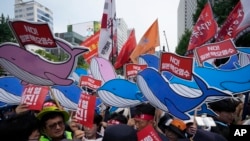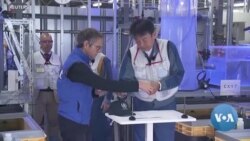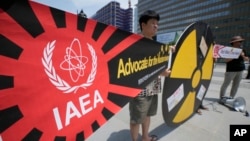WASHINGTON - South Korean officials are seeking to tamp down domestic opposition to the likely release of treated wastewater from Japan’s Fukushima nuclear power plant.
The release has the potential to undermine a recent warming of relations between the two countries in the face of an increasingly aggressive China, and some analysts worry that Beijing could use it to try to drive a wedge between them.
International Atomic Energy Agency (IAEA) Director General Rafael Grossi is expected to visit Seoul from Friday to Sunday to explain his approval for Japanese plans to release the treated water from the Fukushima Daiichi nuclear power plant into the Pacific Ocean.
Grossi issued the approval Tuesday during his trip to Tokyo where he presented a 140-page IAEA report to Japanese Prime Minister Fumio Kishida.
Grossi said in the report the release of the water into the ocean would have a "negligible radiological impact on people and the environment."
However the plan to release the water has fueled protests in South Korea. Thousands of people have been gathering in Seoul, demanding the Yoon government block it.
Opposition Democratic Party leader Lee Jae-myung said Thursday at an overnight protest at the National Assembly that the government of President Yoon Suk Yeol is "forcing people to believe Japan and the IAEA report."
However the Yoon administration has declared it is satisfied with the IAEA's safety review. During a news briefing on Wednesday, Park Ku-yeon, the first deputy chief of the Office for Government Policy Coordination, said the government recognizes the IAEA "as a prestigious internationally agreed-upon agency and we respect its findings."
Experts said Beijing could use the protests against the dumping of the water into the ocean as a political tool to separate the renewed Seoul-Tokyo ties. Washington views the bilateral ties between its key allies as important in its effort to counter China's regional assertiveness.
Dennis Wilder, senior director for East Asia Affairs at the White House's National Security Council during the George W. Bush administration, said, "Beijing has been working hard to try to find ways to divide the increasingly effective trilateral relationship so it would not be a surprise if they try to exploit this issue by attempting to scare the public in South Korea and elsewhere in the region."
He continued, "Nuclear power and nuclear waste are highly charged issues, and it is easy to mislead the public with disinformation even if a credible international organization like the IAEA has ruled the activity safe."
During a press briefing Wednesday, Chinese Foreign Ministry spokesperson Wang Wenbin said, "The report should not be the 'shield' or 'green light' for Japan's discharge of nuclear-contaminated water into the ocean."
Wang continued to say the report does not address "the strong opposition" to the discharge by the people of Japan, South Korea, Pacific Island countries and elsewhere.
The IAEA report concluded the discharge of 1.3 million metric tons of wastewater from the Fukushima plant, which has been filtered through the Advanced Liquid Processing System, would be safe as it meets the international safety standard. The system removes most radioactive contamination with the exception of tritium.
The findings were based on a two-year assessment by an IAEA task force advised by experts from 11 countries, including China, South Korea, and the U.S., according to the IAEA.
The Fukushima nuclear power plant was damaged by a deadly combination of an earthquake and tsunami in 2011, causing reactors to overheat and contaminate water in the plant with radioactive material.
New water was used to cool the damaged reactors, and now that water is stored in about 1,000 tanks, the amount equivalent to about 500 Olympic-size swimming pools.
Japan is planning to release the water over the next 30 to 40 years, starting around August, according to the IAEA.
South Korea sent a team of 21 experts to examine the safety of the treated water in the Fukushima plant in May and plans to release its own report soon. Yoon and Kishida are expected to discuss the discharge of the water on the sidelines of a NATO summit next week in Lithuania.
The U.S. "welcomes" the IAEA report, "noting Japan's plans to release treated water from the Fukushima Daiichi nuclear site are safe and consistent with internationally accepted nuclear safety standards," Matthew Miller, a spokesperson for the State Department, said on Wednesday.
Robert Manning, a senior fellow at the Stimson Center's Reimaging U.S. Grand Strategy Program, said Beijing could use the issue "to drive a wedge between Seoul and Tokyo and halt the trajectory of South Korea-Japan security and economic cooperation." He noted that China has tried to "inflame South Korean historic distrust of Japan" in the past.
Yoon reached out to Tokyo in March to mend ties frayed over a longtime dispute with roots in the Japanese occupation of the Korean Peninsula from 1910 to 1945. The rapprochement resulted in summits with Kishida in March and May, the first for the two nations in 12 years.
The two leaders also met on the sidelines of the G7 summit in Hiroshima and held a trilateral meeting with U.S. President Joe Biden. He invited them to Washington for a trilateral summit on an unspecified date later this summer.
Andrew Yeo, the SK-Korea Foundation Chair in Korea Studies at Brookings Institution's Center for East Asia Policy, said despite Beijing being "very vocal" about the discharge and attempting "to find common cause with Seoul in driving a wedge between Tokyo and Seoul," the U.S. should not be "too worried."
Yeo continued, "Trilateral cooperation is proceeding with strong understanding that ongoing cooperation is necessary to deter and defend against North Korean threats and also coordinate on broader Indo-Pacific issues."







